|
Seminars and Events
|
| February 27, 2026 |
-
Title: Guiding with Search: Memory-Aware Abstraction for Scalable Vulnerability Detection
Time: 10:30am
Venue: CB 308
Speaker(s): Prof. Heqing Huang
Remark(s): Abstract
Along with software development, system reliability and robustness have become major concerns. However, due to the complex program semantics, efficiently detecting these vulnerabilities remains challenging. This talk introduces a new perspective, search-space guided analysis with adapted memory organization, to significantly improve the performance of vulnerability detection. Unlike existing efforts that focus solely on the code itself, our approach integrates abstraction with runtime memory as both an oracle and a guidance for better vulnerability detection. The related work has received the ASPLOS Best Paper award and the Google Research Paper award. The artifact has also been successfully integrated into the most widely used compiler infrastructure, LLVM.
About the speaker
Heqing Huang is an assistant professor at the Department of Computer Science at City University of Hong Kong. His research focuses on software security, especially leveraging program analysis techniques to ensure software security rigorously. Specifically, his research takes advantage of both static and dynamic program analysis techniques as complements to address deficiency problems in existing vulnerability detection methods, such as fuzzing, symbolic analysis, and memory sanitization. On the other hand, he also aims to demonstrate the practicalness of the general research methods on specific application scenarios, e.g., Android and Linux kernels. His research has received the ASPLOS Best Paper and Google Research Paper awards. He also served on the CCS program committee and as a reviewer for TDSC, TOSEM, and TSE.

|
| February 10, 2026 |
-
Title: Reasoning Beyond LLM: Code, Design, Strategy, and a Vision for Life After AGI: The Player Era
Time: 02:00pm
Venue: CB328, HKU (Zoom broadcasting)
Lecture theater 1A, G/F, CDS-1 Build (On-site)
Speaker(s): Prof. Jin Song DONG
Remark(s): Abstract
The rise of code-centric Large Language Models (LLMs) has reshaped the software engineering world with tools like Copilot, DeepSeek, GPT-5, and Gemini-3 that can easily generate code. However, there is no guarantee of correctness for the code generated by LLMs, which suffer from the hallucination problem. The first part of this talk demonstrates that the program refinement calculus can be utilized as a formal-chain-of-thought to guide LLMs and verify the correctness of the LLM-generated code [POPL 2025]. The second part of this talk investigates LLM-aided System Design and Validation, where LLM-enhanced model-checking agents are developed [ICML 2025, NeurPIS 2025, ASE 2025]. The third part of this talk highlights the limitations of LLMs in solving complex planning and strategy analysis problems that require formal symbolic reasoning techniques [ICLR 2025, AAAI 2026]. At the end of this presentation, a new vision, "Player Era" for life after AGI, will be discussed. This new vision proposes that humanity will evolve into four distinct yet interconnected roles: the Player, the Explorer, the Co-Creator, and the Gate-Keeper, which serve as the pillars of a civilization redesigned for meaning, creativity, and responsibility.
About the speaker
Jin-Song Dong is a professor at the National University of Singapore. His research spans a range of fields, including formal methods with LLM agents, safety and security systems, trusted AI, probabilistic reasoning, sports analytics, and verified LLM code synthesis. He co-founded the commercialized PAT verification system, which has garnered thousands of registered users from over 150 countries. Jin Song also co-founded the commercialized trusted machine learning system Silas (www.depintel.com), with 50K+ downloads. He served on the editorial board of ACM Transactions on Software Engineering and Methodology, Formal Aspects of Computing, and Innovations in Systems and Software Engineering, A NASA Journal. He has successfully supervised 34 PhD students, many of whom have become tenured faculty members at leading universities worldwide. He is a Fellow of the Institute of Engineers Australia. Jin Song developed Markov Decision Process (MDP) models for tennis strategy analysis using PAT, assisting professional players with pre-match analysis (beating the world's best). He created a new conference series on Sports Analytics (https://formal-analysis.com/isace/2026/).In his spare time, he serves as a tennis coach, taking pleasure in coaching his students and his three children, all of whom have reached the #1 national junior ranking in Singapore/Australia. Two of his children have earned NCAA Division I full scholarships in the US.
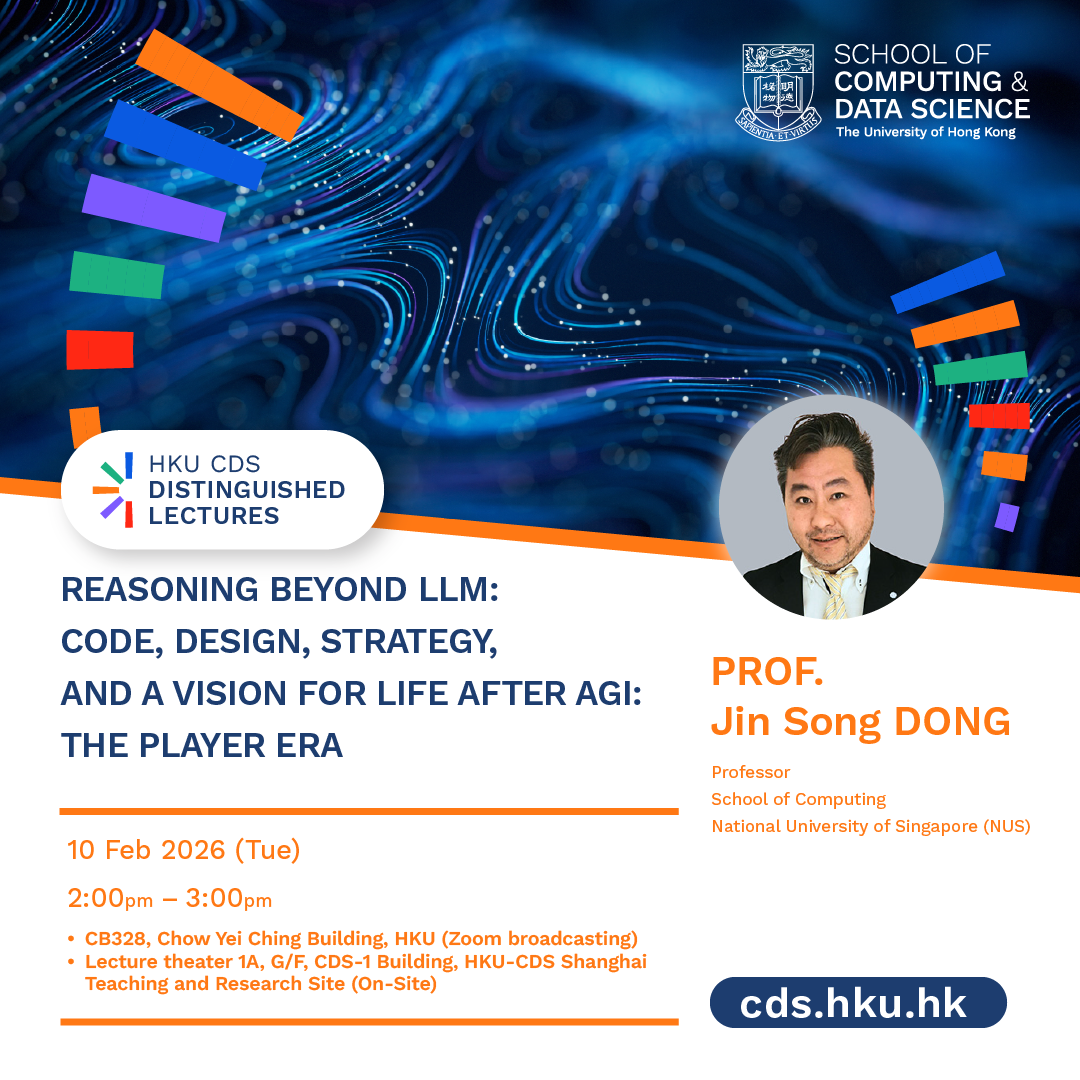
|
| February 09, 2026 |
-
Title: How to Trust a Quantum Box: Bell’s Theorem for Quantum Engineers
Time: 03:00pm
Venue: CB 308
Speaker(s): Prof. Stefano Pironio
Remark(s): Abstract
How can we be sure that a quantum device really performs as intended? As quantum technologies promise secure communication, certified randomness, and unprecedented computational power, verifying their behavior becomes both essential and surprisingly challenging. One of the deepest results of 20th-century physics, Bell’s theorem, has become a practical tool: it allows us to test quantum behavior by treating devices as black boxes and observing only their input–output statistics. In this talk, I’ll introduce the central ideas behind this approach, known as device-independent quantum information, and show how fundamental physics offers new ways to build and trust quantum technologies.
About the speaker
Stefano Pironio is a theoretical physicist working on quantum information theory. He is a F.R.S.–FNRS Research Director at the Université libre de Bruxelles (ULB). He obtained his PhD from ULB in 2004 and held postdoctoral positions at Caltech, ICFO–The Institute of Photonic Sciences, and the University of Geneva. His work has been recognized with the QIPC Young Investigator Award, the De Donder Prize of the Belgian Academy of Sciences, and the Prix La Recherche.
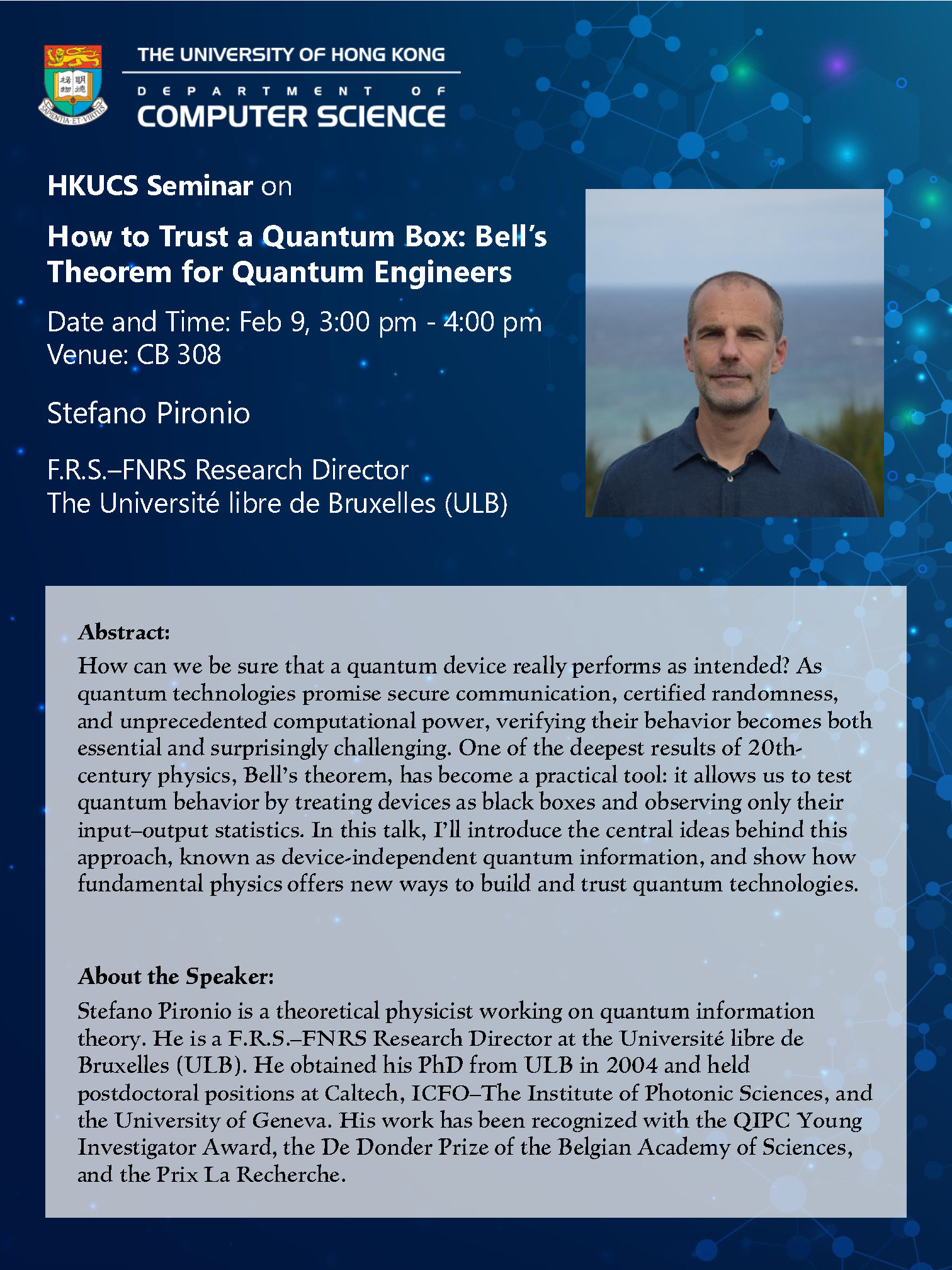
|
| February 05, 2026 |
-
Title: Weighted Q-Learning for Optimal Dynamic Treatment Regimes with Nonignorable Missing Covariates
Time: 03:30pm
Venue: Room 301, 3/F, Run Run Shaw Building
Speaker(s): Prof. Bo Fu
Remark(s): Abstract
Dynamic treatment regimes (DTRs) formalize medical decision-making as a sequence of rules for different stages, mapping patient-level information to recommended treatments. In practice,estimating an optimal DTR using observational data from electronic medical record (EMR)databases can be complicated by nonignorable missing covariates resulting from informative monitoring of patients. Since complete case analysis can provide consistent estimation of outcome model parameters under the assumption of outcome-independent missingness, Q-learning is a natural approach to accommodating nonignorable missing covariates. However, the backward induction algorithm used in Q-learning can introduce challenges, as nonignorable missing covariates at later stages can result in nonignorable missing pseudo-outcomes at earlier stages, leading to suboptimal DTRs, even if the longitudinal outcome variables are fully observed. To address this unique missing data problem in DTR settings, we propose 2 weighted Q-learning approaches where inverse probability weights for missingness of the pseudo-outcomes are obtained through estimating equations with valid nonresponse instrumental variables or sensitivity analysis. The asymptotic properties of the weighted Q-learning estimators are derived,and the finite-sample performance of the proposed methods is evaluated and compared with alternative methods through extensive simulation studies. Using EMR data from the Medical Information Mart for Intensive Care database, we apply the proposed methods to investigate the optimal fluid strategy for sepsis patients in intensive care units.
About the speaker
Bo Fu currently is a professor at the School of Data Science, Fudan University, China. He obtained the PhD degree from the department in 2003, and then moved to Cambridge University for a PostDoc fellow. He has worked at the Nanyang Technological University, Manchester University and University College of London. Prof. Fu’s research areas include, but not limited to, statistical theory and application, big medical data, etc. He has published many papers at the top journals in statistics or medicine.
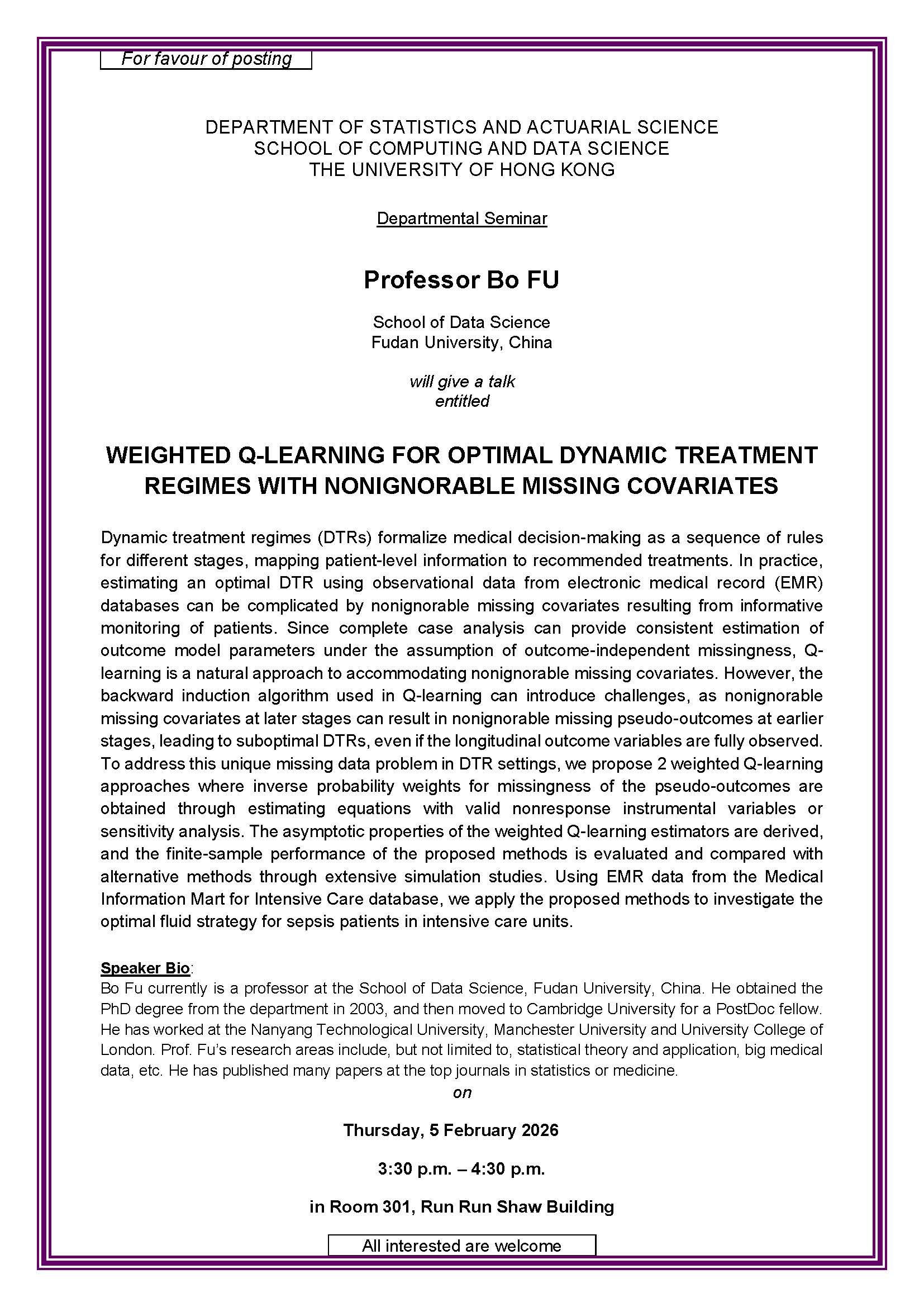
|
| February 04, 2026 |
-
Title: Large Language Models in the Financial Domain
Time: 04:30pm
Venue: Room 301, Run Run Shaw Building
Speaker(s): Prof. Liwen Zhang
Remark(s): Abstract
The report provides a systematic review of the evolution of large language models (LLMs), tracing their development from the emergence of generative AI to the forefront of multimodal and world model advancements. It examines the paradigm shifts induced by AI across scientific research,education, and industrial domains, emphasizing data-driven and collaborative approaches that enhance decision-making processes. The study details the research team's latest innovations in the financial sector, including the Fin-R1 model, constructed through reinforcement learning to augment financial reasoning capabilities; the FinEval benchmark, designed for the rigorous assessment of Chinese financial domain knowledge; the VisFinEval benchmark, a scenario-driven multimodal evaluation framework that encompasses a comprehensive understanding of front-, mid-, and back-office financial operations; and the FinGAIA benchmark, tailored to evaluate AI agents within real-world financial contexts. These advancements underscore the transformative potential of LLMs in financial risk management, customer service, and business transformation, while actively facilitating the intelligent upgrading of the financial industry and contributing to the establishment of an efficient and secure financial ecosystem.
About the speaker
Liwen Zhang is a professor jointly appointed by the School of Statistics and Data Science and Dishui Lake Advanced Institute of Finance, Shanghai University of Finance and Economics. He is also the director of the AI Finance Development and Service Center, the director of the Shanghai Financial Intelligence Engineering Technology Research Center, the deputy director of the Key Laboratory of Mathematical Economics of the Ministry of Education, and the vice dean of the Institute of Data Science and Statistics.
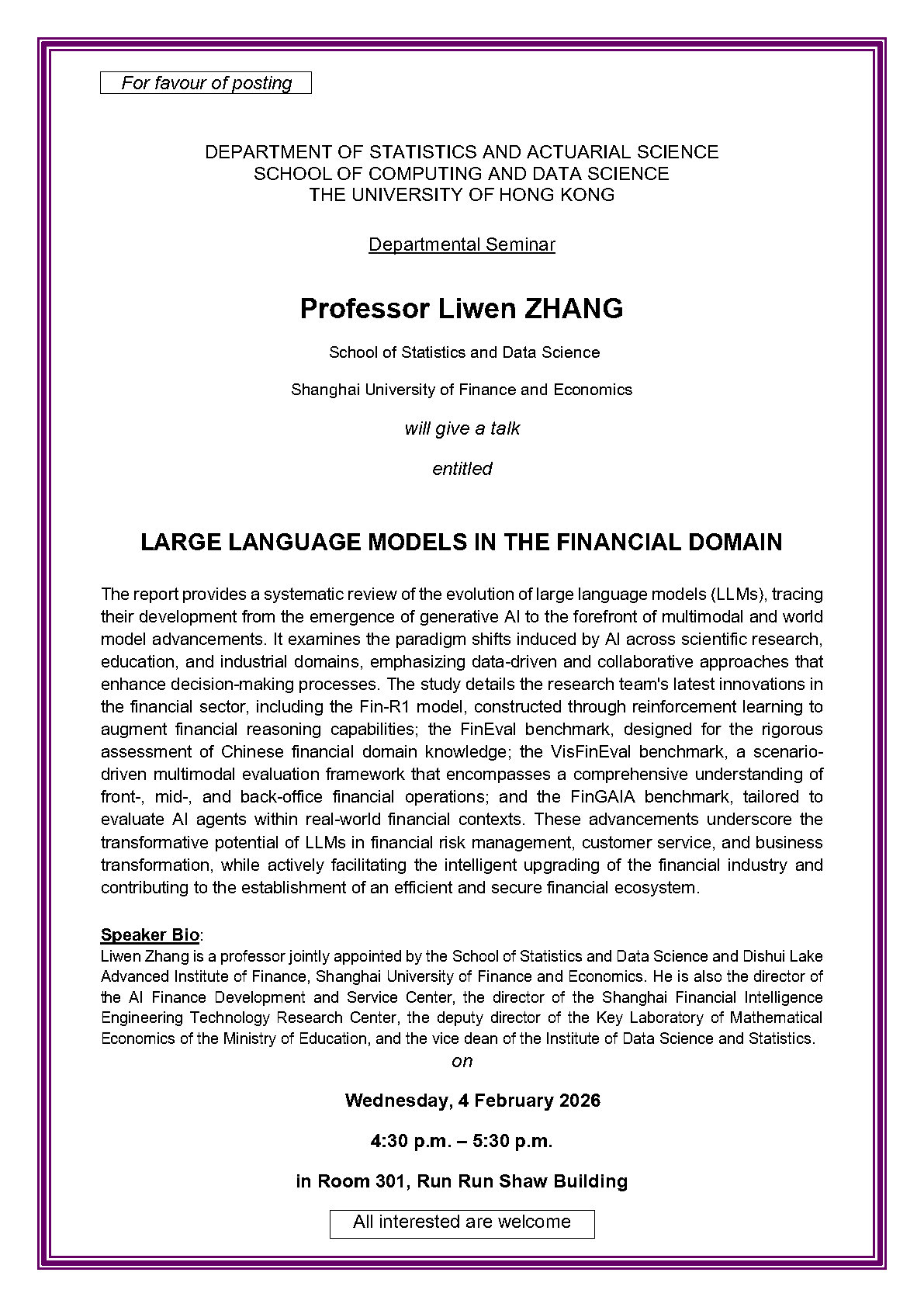
|
| February 03, 2026 |
-
Title: AI in Security: Applications and Challenges
Time: 09:30am
Venue: CB 328
Speaker(s): Prof. Kai Chen
Remark(s): Abstract
The emergence of artificial intelligence (AI) has significantly impacted security research. On one hand, AI can enhance traditional defenses, making them more intelligent and efficient. On the other hand, intrinsic security issues of AI—such as adversarial examples, backdoors, large model "jailbreaking," hallucinations, and privacy concerns—have raised serious apprehensions regarding its deployment. This talk will address both aspects: it will focus on leveraging AI to advance software security research and also examine the security vulnerabilities of AI systems from a software adversarial perspective.
About the speaker
Dr. Kai Chen is a Professor at the Institute of Information Engineering, Chinese Academy of Sciences (IIE, CAS), and a Professor at the University of Chinese Academy of Sciences (UCAS). He serves as Director of the Center for Frontier Innovation and Integration of Science and Education, and Deputy Director of the State Key Laboratory of Cybersecurity Defense. He is a recipient of the National High-Level Talent Program and has been honored with numerous awards, including Global Youth Leader at the World Internet Conference, CAS Young Scientist Award, CCF-IEEE CS Young Computer Scientist Award, Beijing Science and Technology Award – Outstanding Youth Zhongguancun Prize, NASAC Young Software Innovator Award, Beijing Outstanding Youth Science Fund, and BAAI Young Scientist Fellowship. He has published over 150 papers in top-tier venues such as IEEE S&P, USENIX Security, ACM CCS, NDSS, and ICSE.
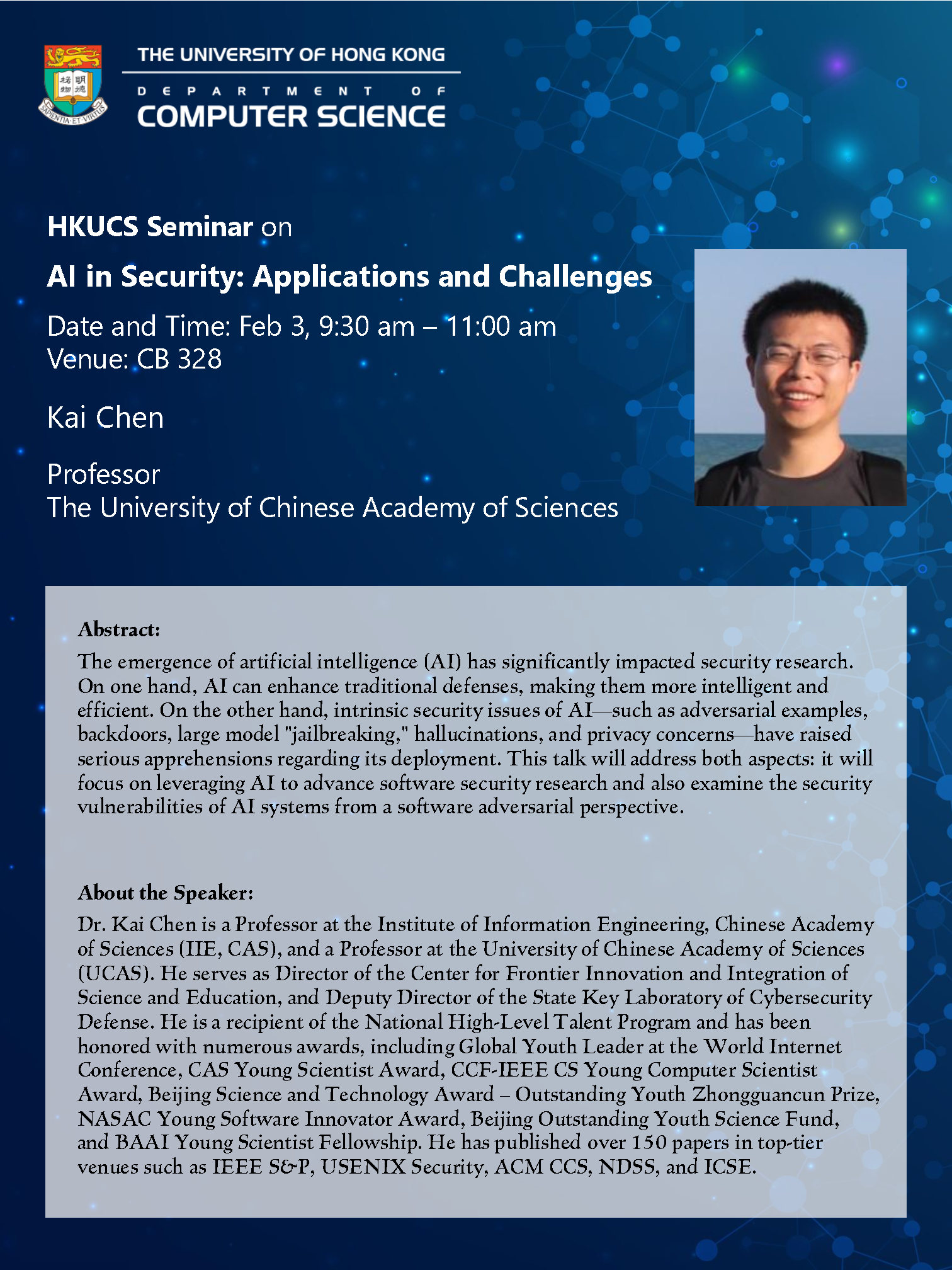
|
| February 02, 2026 |
-
Title: Scaling LLM Pre-training through Optimizing Data- and Management-Plane Communications
Time: 12:00pm
Venue: CB 308
Speaker(s): Dr. Zhuang Wang
Remark(s): Abstract
Large language models (LLMs) are profoundly reshaping the global economies and technology. Efficient systems for LLM pre-training are essential because they directly impact model quality, operational costs, and environmental sustainability. In this talk, Zhuang will present two system research projects designed to tackle fundamental communication challenges within LLM pre-training. ZEN (OSDI ‘25) addresses data plane challenges by optimizing synchronization strategies for sparse tensor communications. GEMINI (SOSP ’23) focuses on the management plane by redesigning the checkpoint storage system engineered to minimize failure recovery overheads.
About the speaker
Zhuang Wang is a Senior Applied Scientist at Amazon Annapurna Labs. He earned his Ph.D. in Computer Science from Rice University in 2023. His current research interests focus on efficient training and inference systems for large language models. He has published papers as the first author in prestigious venues including OSDI, SOSP, SIGCOMM, and EuroSys. Zhuang has served on the Program Committee for OSDI, ATC, and MLSys.
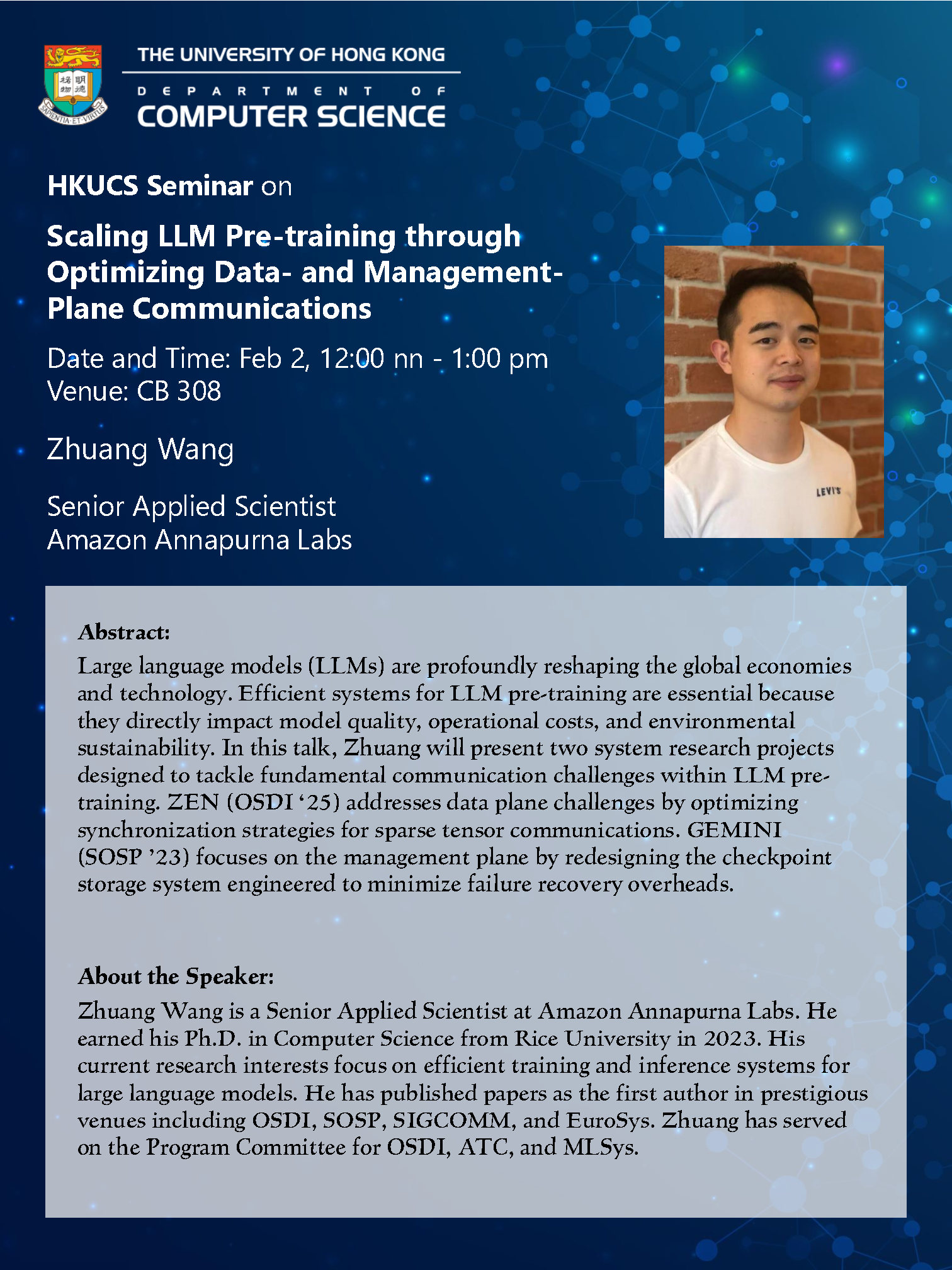
|
| January 30, 2026 |
-
Title: P+P ≧ PSPACE: Deep Logic, Strategic Losing, and Game Secrets
Time: 03:30pm
Venue: HW312, Haking Wong Building
Speaker(s): Prof. Shang-Hua Teng
Remark(s): Abstract
A combinatorial game is defined by a ruleset specifying positions and feasible moves. In the normal-play setting, two players alternate moves, and the player forced to play at a terminal position—where no moves remain—loses. Optimal play often requires deep strategic reasoning and is typically PSPACE-hard. In Combinatorial Game Theory (CGT), the disjunctive sum of two games GGG and HHH, denoted G+HG + HG+H, allows the next player to move in exactly one component game.
In this talk, Prof. Teng shows that the sum of two polynomial-time solvable games can be PSPACE-hard. In other words, P + P ≥ PSPACE, where P and PSPACE represent families of polynomial-time and polynomial-space solvable games, and “+” denotes the disjunctive sum. This contrasts with classical Sprague-Grundy Theory (1930s), which states that the Grundy value of the sum of impartial games can be computed in polynomial time. Assuming PSPACE ≠ P, he proves there is no general polynomial-time method to combine two polynomial-time solvable impartial games to efficiently solve the sum. The results settle two long-standing complexity questions in CGT, open since 1981 and 1993. He will also draw a connection between the theorem and a famous Chinese idiom honouring strategist Zhuge Liang(諸葛亮) from The Romance of the Three Kingdoms(三國演義).

|
| January 23, 2026 |
-
Title: Safeguarding the Web3 Fintech Ecosystem Across the Full Stack
Time: 11:15am
Venue: CB 308
Speaker(s): Prof. Daoyuan Wu
Remark(s): Abstract
The emergence of Web3 is reshaping the Fintech landscape by enabling decentralized, trustless value transfer at scale. However, this paradigm shift also introduces new security challenges across multiple layers—from blockchain protocols and smart contract libraries to application-level logic and transaction monitoring. In this talk, I will provide a comprehensive overview of the Web3 security landscape, highlighting empirical studies on system-level blockchain vulnerabilities [FSE'22] and the propagation of bugs in forked chains [NDSS'23]. I will also discuss our latest research on detecting misuse and vulnerabilities in widely adopted smart contract libraries such as OpenZeppelin [USENIX'24 & ASE'25], as well as the role of large language models (LLMs) in enhancing vulnerability reasoning [ICSE'24], automated auditing [ICSE'25], and formal verification [NDSS'25 Distinguished Paper]. Finally, I will outline emerging research directions, including LLM-based transaction analysis and cross-module verification, aimed at achieving a more secure and resilient Web3 ecosystem.

|
| January 19, 2026 |
-
Title: Engineering Faithful and Interpretable AI Systems
Time: 11:30am
Venue: Innovation Wing Two, G/F, Run Run Shaw Building
Speaker(s): Prof. René Vidal
Remark(s): Abstract
Large Language Models (LLMs) and Vision Language Models (VLMs) have achieved remarkable performance across a wide range of tasks. However, their growing deployment has exposed fundamental limitations in faithfulness, safety, and transparency. In this talk, Prof. Vidal will present a unified perspective on addressing these challenges through principled model interventions and interpretable decision-making frameworks. He first introduces Parsimonious Concept Engineering (PaCE), an approach that improves faithfulness and alignment by selectively removing undesirable internal activations, mitigating hallucinations and biased language while preserving linguistic competence. Prof. Vidal then present Information Pursuit (IP), an interpretable-by-design prediction framework that replaces opaque reasoning with a sequence of informative, user-interpretable queries, yielding concise explanations alongside accurate predictions. Results across text, vision, and medical tasks illustrate how these ideas advance transparency without sacrificing performance. Together, these contributions point toward a broader direction for building AI systems that are powerful, faithful, and aligned with human values.
About the speaker
René Vidal is the Penn Integrates Knowledge and Rachleff University Professor of Electrical and Systems Engineering & Radiology, the Director of the Center for Innovation in Data Engineering and Science (IDEAS), and Co-Chair of Penn AI at the University of Pennsylvania. He is also an Amazon Scholar, an Affiliated Chief Scientist at NORCE, and a former Associate Editor in Chief of TPAMI. His current research focuses on the foundations of deep learning and trustworthy AI and its applications in computer vision and biomedical data science. His lab has made seminal contributions to motion segmentation, action recognition, subspace clustering, matrix factorization, deep learning theory, interpretable AI, and biomedical image analysis. He is an ACM Fellow, AIMBE Fellow, IEEE Fellow, IAPR Fellow and Sloan Fellow, and has received numerous awards for his work, including the IEEE Edward J. McCluskey Technical Achievement Award, D’Alembert Faculty Award, J.K. Aggarwal Prize, ONR Young Investigator Award, NSF CAREER Award as well as best paper awards in machine learning, computer vision, signal processing, controls, and medical robotics.

|










